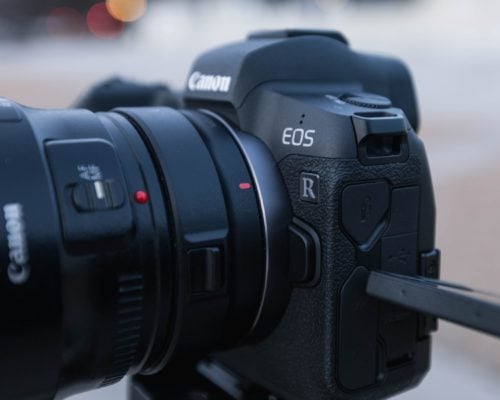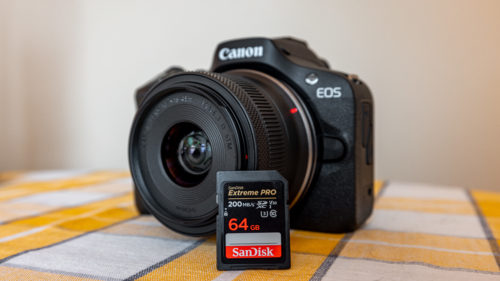A lens mount is the connection between lenses and camera bodies. Canon created the Canon RF lens mount for their new mirrorless cameras which was announced in 2018. The RF lens mount was first featured in the EOS R and now appears in many Canon mirrorless cameras including the R5 and R8.
Additionally in 2022 Canon created RF-S lenses which are designed for cropped RF cameras. If a RF-S lens is attached to a full frame RF mount camera it’ll function as a can APS-C camera.
Canon’s older EF lens mount has been around since 1987. Both the Canon EF and RF mounts consist of a 54mm diameter but the RF mount is designed for a 20mm flange focal distance (the distance from the sensor to the lens). This allows Canon to create new form factors for lenses letting more light into the sensor.
Some of the more popular RF lenses include:
- Canon RF 15-35mm f/2.8 (sample photos)
- Canon RF 24-70mm f/2.8
- Canon RF 28–70mm F2
- Canon RF 70-200mm f/2.8
More RF lenses can be seen here.
Can you use RF lenses on EF mounts?
You cannot use RF lenses on an EF mount Canon camera. Since Canon RF lenses are designed for mirrorless cameras they are designed to be closer to the camera sensor. This makes it impossible to use on EF mount bodies since the EF mount bodies are larger with more space between the sensor and lens mount. Additionally an RF lens will not connect to a EF mount since the connection is different.
Can you use EF lenses on RF mounts?
While EF and EF-S lenses won’t work directly on the RF mount you can use them with RF camera. To use a EF lens on an RF mount camera you’ll have to get the official Canon EF to RF mount adapter which are typically around $100. From my usage the adapter works exactly like you’d expect and all of my EF lenses worked perfectly on my new Canon mirrorless cameras.
What is the difference between Canon RF lenses and EF lenses?
The main difference between Canon RF lenses and EF lenses is the mount. RF lenses are designed to be used with Canon’s full-frame mirrorless cameras, while EF lenses are designed to be used with Canon’s DSLR cameras. Canon has basically stopped all research on EF lenses, so RF lenses are the future of their lens line-up. RF lenses also have a wider mount diameter, which allows for faster autofocus and improved image quality.
What types of Canon RF lenses are available?
Canon currently offers a range of RF lenses, including wide-angle, standard, and telephoto zoom lenses, as well as prime lenses. Some popular RF lenses include the Canon RF 24-70mm f/2.8L IS USM, the Canon RF 50mm f/1.2L USM, and the Canon RF 70-200mm f/2.8L IS USM.
Are Canon RF lenses compatible with third-party camera brands?
No, Canon RF lenses are not compatible with third-party camera brands. They are designed specifically for use with Canon’s full-frame mirrorless cameras like the Canon EOS R5 and Canon EOS R6.
Do Canon RF lenses have image stabilization?
Many Canon RF lenses feature image stabilization, including the Canon RF 24-70mm f/2.8L IS USM and the Canon RF 70-200mm f/2.8L IS USM. However, not all RF lenses have image stabilization.
Are Canon RF lenses weather-sealed?
Many Canon RF lenses are weather-sealed, including the Canon RF 24-70mm f/2.8L IS USM and the Canon RF 70-200mm f/2.8L IS USM. However, not all RF lenses are weather-sealed. Typically “L” series Canon lenses are weather sealed and RF lenses are no exception.
Are Canon RF lenses more expensive than EF lenses?
Generally, Canon RF lenses are more expensive than EF lenses. This is because they are newer and designed specifically for use with Canon’s full-frame mirrorless cameras, which require more advanced technology than Canon’s DSLR cameras. However, prices vary depending on the specific lens, Canon still offers a range of affordable RF lenses.
Do Canon RF lenses come with a warranty?
Yes, all Canon RF lenses come with a one-year limited warranty. Customers can also purchase an extended warranty for additional coverage.
Conclusion
I hope this quick post gave you a better understand of what a Canon RF lens is. If you have any questions about the Canon RF system let me know in the comments below!




